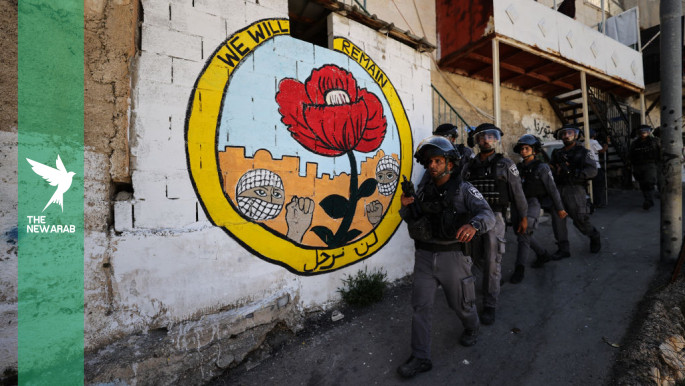Israeli forces evict residents of in Batn al-Hawa neighbourhood in Silwan on claims of being built on Jewish-owned land in June 2021 [Mostafa Alkharouf/Anadolu Agency via Getty]
Around 700 Palestinian residents of Jerusalem’s Batn al-Hawa neighbourhood in Silwan fear imminent eviction following a recent ruling by Israel’s Supreme Court.
The ruling, issued on 18 June with no right of appeal, ordered the evacuation of a property made up of three residential apartments which belongs to the Shweiki and Odeh families.
However, locals also fear the step may lead to eviction plans for 87 other threatened homes in Batn al-Hawa being implemented.
Residents of the Jerusalem neighbourhood which lies on the southern flank of the Al-Aqsa Mosque Compound in East Jerusalem have been battling eviction since 2015.
In that year, the Israeli settler association Ateret Cohanim began filing legal claims for a plot of land in Batn al-Hawa, based on a decision by Israel’s “Custodian of Absentee Property” which claimed that the land measuring five dunums and 200 sqm was rightfully owned by Yemeni Jews dating back to the Ottoman era in 1881.
Ateret Cohanim’s claims are based on an Israeli law from 1970, which allows Jews to reclaim property in East Jerusalem they claim to have owned before 1948, while Palestinians are denied any equivalent right to reclaim properties seized from them in occupied Jerusalem and elsewhere.
Zuhair Al-Rajabi, head of the Batn al-Hawa neighbourhood committee, says the settler association has been filing for eviction notices since 2015.
“Yemeni Jews left the area between 1939 and 1943, which was before the establishment of the occupying state [Israel]. They sold their properties to Palestinians, given that the Palestinians had welcomed them to the area, while the wider Jewish community at the time refused to receive them because of their Arab origins,” says Rajabi.
The families’ defence lawyer Nael Rashed, explained to Al-Araby Al-Jadeed that “the eviction cases have been progressing through the Israeli court system over several years, eventually reaching the Supreme Court, which in 2020 suspended a magistrate court’s decision to evict the Shweiki and Odeh families from the three apartments, pending a response from the Israeli Attorney General.”
However, he says, both attorney generals during the five years since then have ignored the court’s request and failed to provide a legal opinion, which has led to the Supreme Court judge looking at the case, Noam Sohlberg – who is himself a settler – to say the original lower court judgement ordering the evictions should be upheld.
Despite the families having lived there for decades, the court rejected the principle of statutory limitation, claiming that the rights of the Custodian of Absentee Property don’t expire. It then approved the survey the settlers submitted outlining the boundaries of the land and their claim of ownership.
Fakhri Abu Diab, a researcher in Jerusalem affairs and a resident of Silwan, said that “this settler judge didn’t rely on any legal evidence, nor did he even notify the families involved. He issued a ruling without the presence of the families or their legal defence team, all under the pretext of war, emergency conditions, and the current crisis.”
Rami Saleh, director of the Jerusalem branch of the Jerusalem Legal Aid and Human Rights Centre, said: “The ruling cannot be appealed, making it a final decision that will impact similar cases and become part of the Supreme Court’s broader policy.”
According to Saleh, this policy amounts to “legalising violations, targeting Palestinian homes in Jerusalem, and delivering them to settler groups and associations – all steps towards the ultimate goal of emptying Jerusalem, particularly Silwan, of its Palestinian residents.”
In a report released on June 24, the Palestinian Jerusalem Governorate said that this development comes amid an intensifying campaign of Israeli settlement targeting the Silwan area of East Jerusalem, which is home about 60,000 Palestinians.
This includes several areas of Silwan – Al-Bustan, Wadi Hilweh, Wadi Yasul, and Ein al-Loz – which have come under the increasing control of settler organisations such as Elad, which operates the so-called “City of David” park and carries out archaeological excavations in the hope of “proving” Israeli historical claims to the area.
The Jerusalem Governorate area called on the international community, the UN, and human rights groups to take urgent action to put an end to the forced displacement, hold Israel accountable for its treatment of Palestinian civilians in Jerusalem, and support the steadfastness of the residents – legally, politically, and on the ground.
This is an edited and abridged translation from our Arabic edition.
